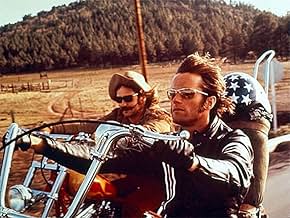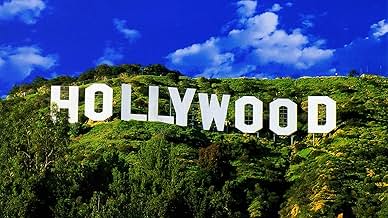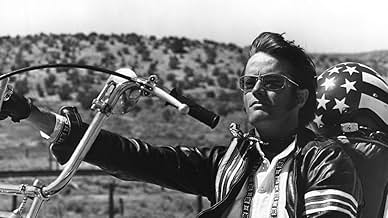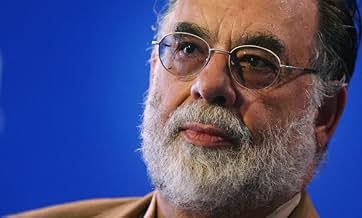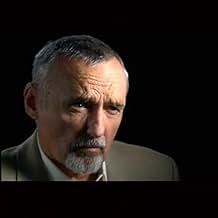Como a Geração Sexo, Drogas E Rock'n'roll Salvou Hollywood
Título original: Easy Riders, Raging Bulls: How the Sex, Drugs and Rock 'N' Roll Generation Saved Hollywood
AVALIAÇÃO DA IMDb
7,5/10
3,2 mil
SUA AVALIAÇÃO
Adicionar um enredo no seu idiomaA look at 1970s Hollywood when it was known as New Hollywood, and the director was the star of the movie.A look at 1970s Hollywood when it was known as New Hollywood, and the director was the star of the movie.A look at 1970s Hollywood when it was known as New Hollywood, and the director was the star of the movie.
- Direção
- Roteiristas
- Artistas
Sam Peckinpah
- Self
- (cenas de arquivo)
- Direção
- Roteiristas
- Elenco e equipe completos
- Produção, bilheteria e muito mais no IMDbPro
Avaliações em destaque
I read the book EASY RIDERS, RAGING BULLS by Peter Biskind and was amazed by it... If 'm honest I'm ashamed to say I rarely read for pleasure and it's something that I do meen to put right but EASY RIDERS, RAGING BULLS was an exception. Cliché's like "Couldn't put the book down" spring to mind!
Anyway this was a good, interesting documentary based on the points brought up in Biskind's book!
As a documentary it's very standard but the sheer subject matter makes it a very good 110 minutes of viewing.
Shame some of the big names didn't agree to appear on this film... it would have been so much better!
Anyway this was a good, interesting documentary based on the points brought up in Biskind's book!
As a documentary it's very standard but the sheer subject matter makes it a very good 110 minutes of viewing.
Shame some of the big names didn't agree to appear on this film... it would have been so much better!
This docu makes the misguided error of comparing the careers of Hal Ashby and Steven Spielberg. More different film-makers there have never been. However, by sheer virtue of sharing artistic or commercial success in Hollywood in the same decade, these two anomylous inclusions are lumped in together. Peter Bogdanovich regales us simpletons with his self-encyclopedia, as if he were ever more than a journey-man director. It's intriguing to see the commercial success of The Exorcist and the critical success of Mean Streets sharing the same five minute discussion with various Hollywood talking heads all of whom are past their prime.
One of the rare gems of the film is the sequence recalling how Martin Scorcese, Paul Schrader, George Lucas, Spielberg and many other prominent male film-makers would hang out in the same beach houses in Malibu, but it's only ten minutes long. This is a film obsessed with the tangential perks of that divine spark that was the 70's renaissance of American movies. Presumably this film is based on a best-selling book of the same name, but all this film can sum up is that a bunch of cool movies came out in the 70's, and that, YES, the men who made those movies hung out from time to time. Honestly, you'd be better off just watching every film by the directors that this film interviews and save yourself the thankless task of listening to too many Hollywood has-beens pine for yesteryear. What really happened to these people's careers? Drugs for some, ego for others. Spotty at best, this film just isn't all it could be. 3/10
One of the rare gems of the film is the sequence recalling how Martin Scorcese, Paul Schrader, George Lucas, Spielberg and many other prominent male film-makers would hang out in the same beach houses in Malibu, but it's only ten minutes long. This is a film obsessed with the tangential perks of that divine spark that was the 70's renaissance of American movies. Presumably this film is based on a best-selling book of the same name, but all this film can sum up is that a bunch of cool movies came out in the 70's, and that, YES, the men who made those movies hung out from time to time. Honestly, you'd be better off just watching every film by the directors that this film interviews and save yourself the thankless task of listening to too many Hollywood has-beens pine for yesteryear. What really happened to these people's careers? Drugs for some, ego for others. Spotty at best, this film just isn't all it could be. 3/10
This documentary spans a period from about 1960 to 1980. The traditional Hollywood system was quickly crumbling--brought on by some incredibly expensive flops, such as "Cleopatra". And, because television had taken away from the film business so much, profits were way, way down. In reaction against the past and to help them out of financial meltdown, the studios turned their eyes to a whole new breed of filmmakers--folks who were making films that were little like the films of old. Now the new auteurs were the boss-- and in many cases they were wildly successful and in a few others they became the victims of their own egos and lifestyles. The film features tons of interviews with various Hollywood experts and craftsmen.
While I agree with some of the folks who have reviewed this documentary that many of the films mentioned in the documentary are way overrated, I cannot help but admire the overall quality of the film. It is slickly made, has exceptional graphics and is clearly a work of love. Well worth seeing--particularly if you consider yourself a film buff or expert on the medium.
While I agree with some of the folks who have reviewed this documentary that many of the films mentioned in the documentary are way overrated, I cannot help but admire the overall quality of the film. It is slickly made, has exceptional graphics and is clearly a work of love. Well worth seeing--particularly if you consider yourself a film buff or expert on the medium.
The last golden age of Hollywood film-making is captured in this two hour documentary, based on Peter Biskind's bestselling book of the same name. Director Kenneth Bowser does a commendable job of corralling many of the key names of the period in this light but passable introduction to the topic.
Bowser's treatise of 1970s Hollywood is essentially a potted history of the time many of the key developments and vital films that were made during this period are passed over or given nothing more than a cursory glance. The documentary suffers as a result and added to this, historical inaccuracies are also evident.
Film fans will most enjoy the scenes of archival footage a desperately nerdy George Lucas being introduced as Francis Ford Coppola's 'assistant'; Jack Nicholson, Bob Rafelson, Dennis Hopper and Peter Tork on the set of The Monkees vehicle 'Head'; and the piece de resistance, a home movie with Messrs Spielberg, Lucas, Milius, Coppola, de Palma, Schrader and Scorsese all in the same room. To be a fly on the wall at that party!
There are also current interviews with the likes of Peter Bogdanovich, Dennis Hopper, Peter Bart, John Milius, Michael Phillips, Paul Schrader, Peter Fonda, Albert S. Ruddy and many more figures of the time.
Bowser's documentary serves as a snapshot of the time Biskind's novel is a veritable diary. The book is packed with amazing stories that even a 13-part series couldn't document. Watch this documentary, get a taste of the time and then buy the book to immerse yourself in a fantastic period of American filmic creativity.
Bowser's treatise of 1970s Hollywood is essentially a potted history of the time many of the key developments and vital films that were made during this period are passed over or given nothing more than a cursory glance. The documentary suffers as a result and added to this, historical inaccuracies are also evident.
Film fans will most enjoy the scenes of archival footage a desperately nerdy George Lucas being introduced as Francis Ford Coppola's 'assistant'; Jack Nicholson, Bob Rafelson, Dennis Hopper and Peter Tork on the set of The Monkees vehicle 'Head'; and the piece de resistance, a home movie with Messrs Spielberg, Lucas, Milius, Coppola, de Palma, Schrader and Scorsese all in the same room. To be a fly on the wall at that party!
There are also current interviews with the likes of Peter Bogdanovich, Dennis Hopper, Peter Bart, John Milius, Michael Phillips, Paul Schrader, Peter Fonda, Albert S. Ruddy and many more figures of the time.
Bowser's documentary serves as a snapshot of the time Biskind's novel is a veritable diary. The book is packed with amazing stories that even a 13-part series couldn't document. Watch this documentary, get a taste of the time and then buy the book to immerse yourself in a fantastic period of American filmic creativity.
The withering latter-end of 1960s cinema gave birth to a short-lived area of mainstream artistic vision - the 1970s was a decade wherein "the director was the star of the movie." I've never thought of it this way, but as the documentary points out, it's a valid and poignant summary of the time period.
This documentary - based on the best-selling book - offers an in-depth analysis of the film-making process of the 1970s... it starts out with "Easy Rider," from the late '60s, which became a huge box office success despite its profane content and extremely low budget.
The financial success of the movie seemed to spawn a new generation of artistic, low-budget films -- Scorsese and Coppola seemingly leading the revolution onwards.
Dennis Hopper would later fail with his semi-sequel to "The Last Picture Show" (as chronicled here) but other directors had success with their projects, attracting viewers despite the grungy themes of the films.
I've heard that cinema "died" in the 1970s, so far as that people had stopped going to see movies...without the influx of 1980s blockbusters, we might not have films today. I think that's rather a stretch.
If anything "Raging Bulls, Easy Riders" exaggerates the mild box office returns of the decade and tries to compensate for their low intake by citing critical praise for the films...all well and valid, when discussing the artistic merit...not financial gain.
I found this to be a rather enjoyable documentary, but I didn't learn anything I hadn't already known. It's got some good interviews, but they're not as insightful as they are amusing anecdotes.
If you are a film student, you could probably view a better and more in-depth summary of the decade; however, for novices, this is good starting ground.
This documentary - based on the best-selling book - offers an in-depth analysis of the film-making process of the 1970s... it starts out with "Easy Rider," from the late '60s, which became a huge box office success despite its profane content and extremely low budget.
The financial success of the movie seemed to spawn a new generation of artistic, low-budget films -- Scorsese and Coppola seemingly leading the revolution onwards.
Dennis Hopper would later fail with his semi-sequel to "The Last Picture Show" (as chronicled here) but other directors had success with their projects, attracting viewers despite the grungy themes of the films.
I've heard that cinema "died" in the 1970s, so far as that people had stopped going to see movies...without the influx of 1980s blockbusters, we might not have films today. I think that's rather a stretch.
If anything "Raging Bulls, Easy Riders" exaggerates the mild box office returns of the decade and tries to compensate for their low intake by citing critical praise for the films...all well and valid, when discussing the artistic merit...not financial gain.
I found this to be a rather enjoyable documentary, but I didn't learn anything I hadn't already known. It's got some good interviews, but they're not as insightful as they are amusing anecdotes.
If you are a film student, you could probably view a better and more in-depth summary of the decade; however, for novices, this is good starting ground.
Você sabia?
- CuriosidadesMany of the subjects profiled in author Peter Biskind's book, including directors Steven Spielberg, George Lucas, Robert Altman, and 'William Friedkin', declined interviews for the documentary.
- ConexõesFeatures Sombras do Terror (1963)
Principais escolhas
Faça login para avaliar e ver a lista de recomendações personalizadas
Detalhes
- Data de lançamento
- Países de origem
- Idioma
- Também conhecido como
- Easy Riders, Raging Bulls: How the Sex, Drugs and Rock 'N' Roll Generation Saved Hollywood
- Empresas de produção
- Consulte mais créditos da empresa na IMDbPro
- Tempo de duração1 hora 59 minutos
- Cor
- Mixagem de som
- Proporção
- 1.78 : 1
Contribua para esta página
Sugerir uma alteração ou adicionar conteúdo ausente

Principal brecha
What is the Spanish language plot outline for Como a Geração Sexo, Drogas E Rock'n'roll Salvou Hollywood (2003)?
Responda

